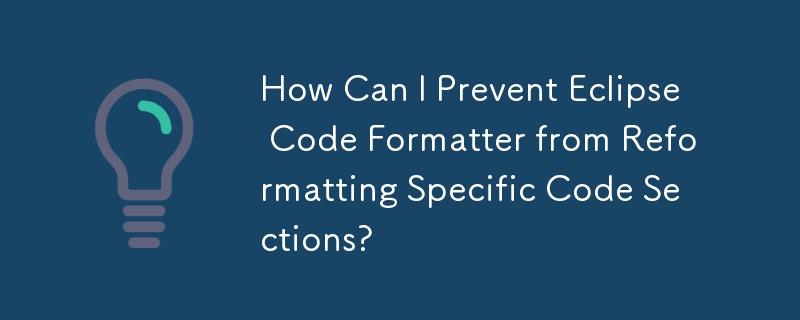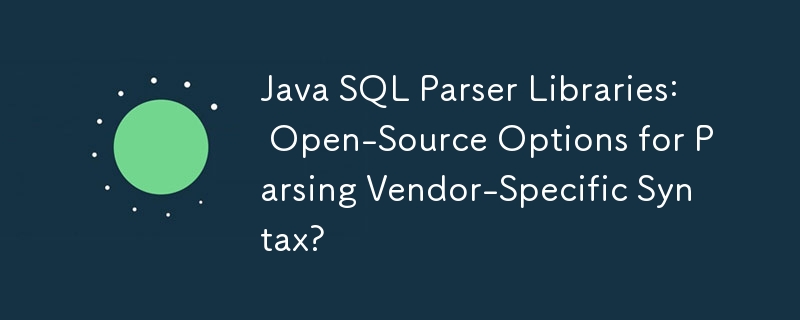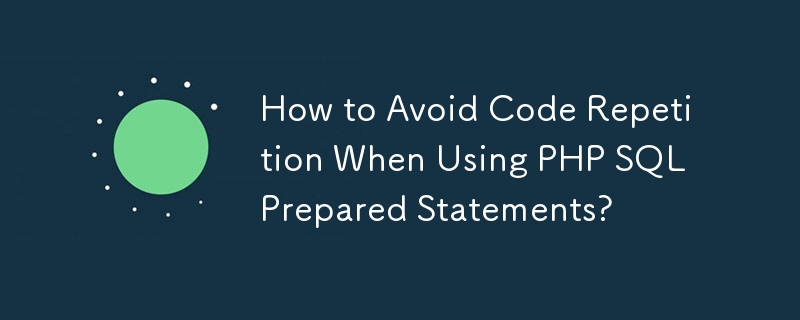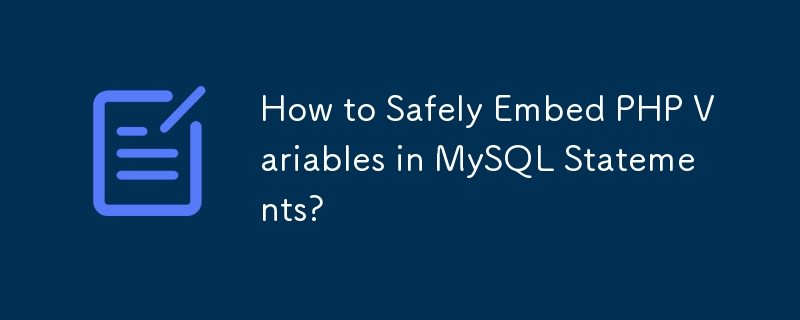Found a total of 10000 related content
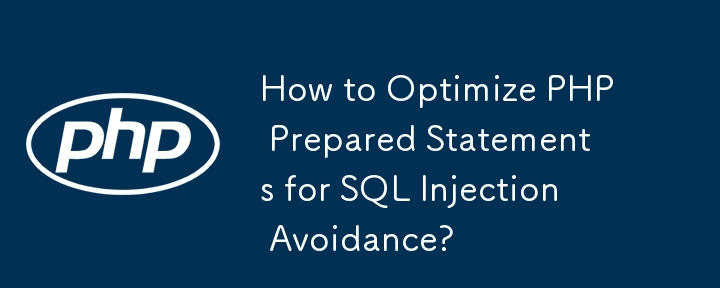
How to Optimize PHP Prepared Statements for SQL Injection Avoidance?
Article Introduction:This article presents best practices for optimizing PHP prepared statements to prevent SQL injections. It emphasizes the crucial steps of error checking, binding parameters correctly, avoiding manual escaping, and setting parameters after binding. Ad
2024-10-21
comment 0
465

How to solve SQL parsing problem? Use greenlion/php-sql-parser!
Article Introduction:When developing a project that requires parsing SQL statements, I encountered a tricky problem: how to efficiently parse MySQL's SQL statements and extract the key information. After trying many methods, I found that the greenlion/php-sql-parser library can perfectly solve my needs.
2025-04-17
comment 0
859

How to Securely Escape Strings Using Prepared Statements in PDO?
Article Introduction:Using Prepared Statements for Secure String Escaping in PDOWhen transitioning from the mysql library to PDO, it's essential to understand how to effectively escape strings to prevent security vulnerabilities like SQL injection. This article explores
2024-10-19
comment 0
489

Year Error when adding dates in Oracle Database using SQL: Causes and Solutions
Article Introduction:This article conducts an in-depth analysis of year errors caused by improper date formatting when using SQL statements to update dates in Oracle databases. The article explains the potential pitfalls of RRRR date format in detail and provides best practices to avoid such problems, including directly using sysdate for date addition and subtraction, and using the trunc() function to remove the time part to ensure the accuracy of date updates.
2025-08-27
comment 0
918


Why use prepared statements in PHP
Article Introduction:Use prepared statements in PHP mainly to prevent SQL injection attacks, improve performance, make the code clearer and easier to debug. 1. It effectively prevents SQL injection through parameterized queries, ensuring that user input is always processed as data rather than SQL logic; 2. Preprocessing statements only need to be compiled once when executed multiple times, significantly improving execution efficiency, especially suitable for batch operations; 3. Parameter binding supports position and named placeholders, separates SQL and data, and enhances code readability and maintenance; 4. Errors can be exposed in advance in the prepare stage, and exceptions can be handled uniformly by setting error mode, which helps to quickly debug.
2025-07-13
comment 0
328

How can Python interact with databases using libraries like sqlite3, psycopg2, or ORMs like SQLAlchemy?
Article Introduction:There are three ways to connect to databases in Python: First, use the sqlite3 module to be suitable for small applications or local development, connect to the database through connect(), execute() to execute SQL statements, and use fetchall() or fetchone() to obtain data, and use parameterized queries to prevent SQL injection; second, use psycopg2 library to be used for PostgreSQL databases, supports JSON fields and complex queries, and you need to install and establish a connection through connect(), use %s to perform parameterized queries and manually submit transactions; third, use SQLAlchemyORM to implement object relationship mapping, and set up a quote through create_engine
2025-06-17
comment 0
700

PHP prepared statement INSERT multiple rows
Article Introduction:Inserting data in batches using preprocessing statements in PHP can be achieved in two ways. 1. Use parameterized placeholders to splice SQL, construct INSERT statements of multi-value groups and execute them at one time, suitable for moderate data volume, high efficiency but limited by SQL package size; 2. Perform multiple execute() operations looping in transactions, the logic is clear and easy to maintain, suitable for uncertain amounts of data, with slightly lower performance but combined with transactions can improve speed. Notes include: batch processing to deal with database parameter limitations, correctly matching field types, enabling transactions to reduce I/O operations, and adding exception processing to ensure data consistency.
2025-07-15
comment 0
922

Efficient execution of multiple MySQL queries in PHP: Tips and Practices
Article Introduction:In PHP, directly using mysqli::query() to execute SQL query strings separated by multiple semicolons will usually only process the first query. This article will introduce in detail two methods to effectively execute multiple MySQL queries in PHP: one is to use SQL's UNION operator to merge multiple SELECT statements into a single result set, which is suitable for queries with the same result structure; the other is to use the mysqli::multi_query() function, which can handle any number and type of SQL statements, but requires more complex code to traverse the result set of each query. The article will also emphasize security and performance considerations in multi-query scenarios.
2025-08-06
comment 0
499

PHP prepared statement SELECT
Article Introduction:Execution of SELECT queries using PHP's preprocessing statements can effectively prevent SQL injection and improve security. 1. Preprocessing statements separate SQL structure from data, send templates first and then pass parameters to avoid malicious input tampering with SQL logic; 2. PDO and MySQLi extensions commonly used in PHP realize preprocessing, among which PDO supports multiple databases and unified syntax, suitable for newbies or projects that require portability; 3. MySQLi is specially designed for MySQL, with better performance but less flexibility; 4. When using it, you should select appropriate placeholders (such as? or named placeholders) and bind parameters through execute() to avoid manually splicing SQL; 5. Pay attention to processing errors and empty results to ensure the robustness of the code; 6. Close it in time after the query is completed.
2025-07-12
comment 0
674


